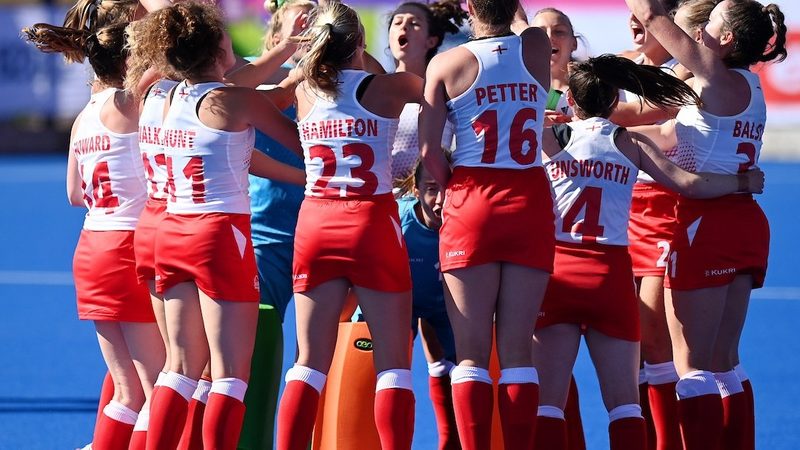
Australia men continued their unbeaten record at the Commonwealth Games with a quite magnificent 7-0 win over India in the final.
The previous day England women had created their own piece of history with a first gold medal as they played some very attractive attacking hockey to beat Australia 2-1.
The bronze medal matches saw India women win their first Commonwealth Games medal since 2006 when they beat New Zealand in a shoot-out after the game finished 1-1. Savita was quite outstanding as she saved four of the New Zealand shoot-out attempts.
England men secured bronze in a frenetic and sometimes chaotic bronze medal against South Africa. Both teams had been involved in gruelling semi-final matches and it showed as the play sometimes descended into a series of turnovers as both sets of players showed exhaustion.
The Commonwealth Games hockey competitions were played at the University of Birmingham with the backdrop of the city and the landmark Old Joe - the world’s tallest free-standing clock tower.
As always at multi-sport events, the hockey attracted big crowds, with the largest, noisiest and happiest being the full stadium that cheered England women home to victory on Sunday 7 August.
The final of the women’s competition was fast and furious but the three factors that secured victory for England were the two supremely well taken goals from Holly Hunt and Tess Howard; the outstanding defensive discipline of Hollie Pearne-Webb, Anna Toman and Giselle Ansley; and the agility and awareness of goalkeeper Maddie Hinch.
For their part, Australia were strong defensively and always looked to be potentially dangerous as they moved forward but on this occasion, they just lacked the extra edge that would have sharpened their attacking moves.
A late goal in the final 20 seconds of the match actually flattered the Hockeyroos as England had been the better team throughout the 60 minutes.
If the Hockeyroos were slightly dulled in their final match, the Kookaburras had sharpened their play to a well-honed knife edge. Every attack seemed destined for the back of the goal and India’s usual guile and movement was just stamped out at every turn. Australia has been off the world stage for a while, but this final proved just what the hockey community has been missing.
Goals came from Blake Govers, Nathan Ephraums (2), Jacob Anderson (2), Tom Wickham and Flynn Ogilvie but the defensive work of the whole team was equally responsible for the annihilation of the India threat – Jeremy Hayward, Jake Harvie, Aran Zalewski, Eddie Ockenden – all over the pitch, these players just didn’t put a foot wrong.
Earlier in the day South Africa men looked to be capable of the biggest upset as they went toe-to-toe with England. At half-time it was 3-3 and both teams looked to be equally capable of either exploding into victory or imploding into defeat.
The yellow card given to Dayaan Cassiem when the score was 4-3 to England was a turning point. Suddenly South Africa were without their speediest player and a player down on the field. England took advantage and moved to 5-3. Head Coach Gareth Ewing removed his keeper but Nduduzo Lembethe did not help the African cause when he received a yellow card that saw the team reduced to 10 for the remainder of the match. England scored in the final minute from a penalty stroke to make it 6-3.
The result meant England men won their third consecutive bronze medal while South Africa recorded their highest finish since 2002. This was all the more remarkable as the team had needed to crowd fund to attend the Games.
For India women the bronze medal was their highest finish since a second place in 2006. The match, against New Zealand, was hard-fought and hugely competitive. India took the lead through Tete Salima and looked to have held onto that lead until the 60th minute when Olivia Merry stepped up to send home a penalty stroke.
In the shoot-out, it was Savita who played the starring role. The India goalkeeper had enjoyed a good tournament but in the shoot-out she moved to another level, saving four of the five New Zealand attempts. From that springboard, her team mates were able to take their chances and win a podium place.
In the women’s competition, Canada women overcame some disappointing earlier results to finish fifth, which equals their previous best place finishes. Scotland and Wales both finished one place higher than 2018 – sixth and eighth respectively. South Africa will be disappointed with a seventh place finish, but their continental compatriots Kenya were delighted to end their campaign with a win to finish ninth, ahead of Ghana.
The men’s competition saw New Zealand finish in a disappointing fifth place after they had been dumped out of the semi-final spots by South Africa. Wales enjoyed their best ever finish in sixth place, with Pakistan in seventh and Canada in eight. Scotland defeated Ghana to avoid the bottom spot.
Top scorer for the men’s competition was England’s Nick Bandurak with 11 goals. he was two ahead of Gareth Furlong of Wales and Harmanpreet Singh of India.
The women’s top scorer was awarded jointly to Grace Balsdon of England and Jean-Leigh du Toit of South Africa.
Women: final standings
- England
- Australia
- India
- New Zealand
- Canada
- Scotland
- South Africa
- Wales
- Kenya
- Ghana
Men: Final standings
Australia
- India
- England
- South Africa
- New Zealand
- Wales
- Pakistan
- Canada
- Scotland
- Ghana
For more information about FIH and hockey in general, please consult FIH.hockey, follow the FIH social media channels - Facebook, Instagram and Twit
#B2022
#HockeyEquals


















